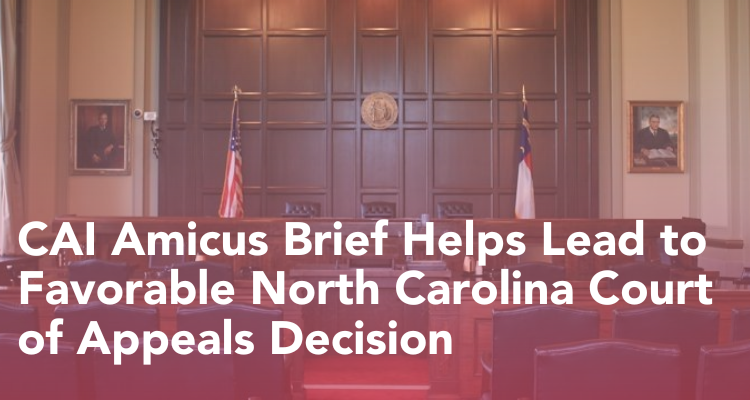Arguments included in a friend-of-the-court brief filed by CAI that recommended courts recognize and uphold the authority of community associations were reiterated in a recent appeals court decision in North Carolina.
In December, the North Carolina Court of Appeals reserved and remanded a trial court’s decision invalidating an association’s amendment to reallocate maintenance responsibilities from an owner to an association for limited common elements.
Alex C. Dale, an attorney with Ward and Smith in Wilmington, N.C., authored CAI’s amicus curiae brief that successfully urged the appeals court to uphold previous association covenant amendments in Alexander v. Becker v. The Courtyards of Huntersville Condominium.
“This opinion recognizes that condominiums without horizontal boundaries may have different designs and may carry unique maintenance requirements, but the community can still dictate by covenant how exterior maintenance will be performed,” says Dale. “It affirms that maintenance and ownership are distinct, and it upholds the Uniform Condominium Act’s intent to allow limited common element maintenance to be set forth in the declaration.”
Two core issues were considered in this appeal: whether a residential condominium had the authority to enact an amendment to its declaration to require its association to maintain certain common elements; and whether the amendment adopted in this case by a supermajority of unit owners was validly enacted.
The appellate court concluded the association did have authority under the North Carolina Condominium Act to maintain limited common elements and assess unit owners for the cost. The amendment did not alter the interests allocated to each unit, and unanimous consent was not required for the amendment to be valid and enforceable.
The issues and ruling in this case are of large importance to community associations in North Carolina and other states that have adopted versions of the Uniform Condominium Act. Many free-standing condominiums allocate maintenance responsibilities to their associations. This decision allows boards to decide how certain limited common elements should be maintained and adopt amendments to effectuate this decision without 100% approval of the membership. This authority is provided under the condominium act or governing documents.
“The trial court held that not only reallocation of ownership, but also reallocation of maintenance responsibilities for limited common elements, required 100% approval of the membership,” states Harmony Taylor, an attorney with Law Firm Carolinas in Charlotte, N.C. Taylor served as counsel for the Courtyards of Huntersville Condominium in this matter.
In rejecting the trial court’s finding, the North Carolina Court of Appeals upheld the important concept that unit owners may collectively agree to change maintenance obligation allocations by nonunanimous approval. “This opinion is consistent with the spirit and letter of the declaration and Uniform Condominium Act, and a contrary finding would have had serious repercussions for condominiums not only in North Carolina but in other states with uniform act based statutory schemes,” adds Taylor, a fellow in CAI’s College of Community Association Lawyers.
CAI supports and recommends consideration and adoption of one or more of the uniform community association acts by all states. In those states where it is not appropriate, practical, or possible to adopt one or more of these uniform acts in their entirety, CAI supports and recommends consideration of appropriate portions of these laws.
More than 2.8 million North Carolinians live in 1.2 million homes in nearly 14,900 community associations, according to the 2023 National and State Statistical Review for Community Association Data published by the Foundation for Community Association Research. Roughly 89% of these residents rate their community association experience as positive (67%) or neutral (22%).
Amicus curiae briefs allow CAI to educate a court about important legal and policy issues in cases related to the community association industry. If your association, municipality, or state needs assistance in contesting an adverse judicial opinion, please contact Phoebe E. Neseth, Esq., at pneseth@caionline.org about submitting a request for an amicus brief.



